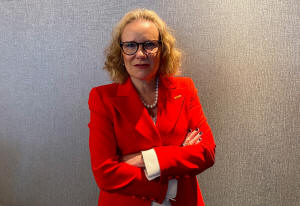|
Belen Garijo, the Spanish CEO of the German maker of drugs, lab
equipment and semiconductor chemicals, said late on Monday that
dependencies between the powers were huge, speaking at a
journalist club event in Frankfurt.
Over the weekend, a Chinese warship crossed in front of a U.S.
destroyer in the sensitive Taiwan Strait, raising the prospect
of future face-offs. But the two sides on Tuesday described
meetings after the incident between senior U.S. and Chinese
officials as constructive.
For months, U.S. and German lawmakers have called for a
reduction in trade to cut dependency on China.
"When I hear politicians say we have to decouple, I don't think
this is feasible ... it will take 20 years to decouple, and for
what?" said Garijo.
"We are risking a global world that has brought wellbeing, more
innovation, more collaboration," she added.
The company's CFO said last month that Merck would further
invest in China and would build domestic supply chains there to
curb imports of key raw materials that could be disrupted in any
trade row.
CEO Garijo said the company would look closely into "different
scenarios on the basis of the potential escalation of the
conflict", but such an escalation was not likely.
German Economy Minister Robert Habeck in March suggested that
Berlin could impose export restrictions on China to prevent
Germany from losing its technological edge, and the government
under Chancellor Olaf Scholz's is working on a strategy paper on
China to be rolled out this year.
(Reporting by Ludwig Burger and Patricia Weiss; editing by David
Evans)
[© 2023 Thomson Reuters. All rights
reserved.]
This material may not be published,
broadcast, rewritten or redistributed.
Thompson Reuters is solely responsible for this content.

|
|




